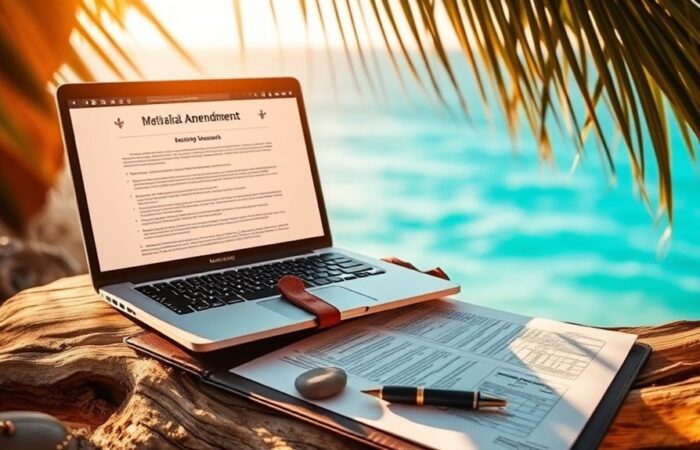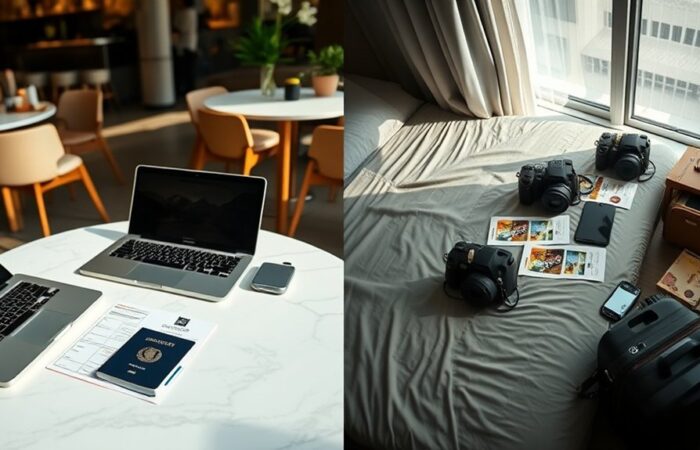You’ve probably heard about Portugal’s growing reputation as a digital nomad haven, but you might not know there’s a strategic way to transition from tourist to resident that maximizes your chances of success. Most remote workers make critical mistakes during this process that can jeopardize their long-term plans. Vieira Braga Advogados has developed a proven two-step approach that turns your initial tourist visit into a launching pad for permanent residency.
Understanding Portugal’s Appeal for Digital Nomads

Whether you’re drawn to cobblestone streets lined with pastel buildings or seeking fiber-optic internet speeds that rival Silicon Valley, Portugal delivers an irresistible combination that’s transforming how remote workers view European living.
You’ll discover Portugal’s cost of living remains significantly lower than other Western European destinations while maintaining excellent infrastructure. Your monthly expenses can drop by 30-50% compared to major tech hubs, yet you won’t sacrifice quality of life.
The country’s strategic timezone aligns perfectly with both European and American business hours, making client communication seamless. You’ll benefit from year-round mild weather, extensive coworking spaces, and a thriving international community.
Portugal’s government actively welcomes digital nomads through favorable visa policies and tax incentives. You can access world-class healthcare, reliable public transportation, and English-speaking services throughout major cities like Lisbon and Porto.
For those seeking long-term residence, Portugal’s Golden Visa program provides a pathway to EU citizenship through investment options starting around €280,000.
The combination creates an ideal environment where productivity meets Mediterranean lifestyle.
Common Pitfalls in the Tourist-to-Resident Transition
Portugal’s compelling advantages can overshadow the administrative complexities that await once you decide to make the move permanent. Many digital nomads underestimate the bureaucratic maze they’ll face when transitioning from tourist to resident status.
You’ll encounter your first hurdle when attempting to secure a NIF (tax identification number) without Portuguese address proof – a classic catch-22 situation. Banks won’t open accounts without proper residency documentation, yet you need banking records for residency applications.
Documentation requirements often catch newcomers off-guard. You’ll need apostilled documents, certified translations, and multiple copies of everything. Missing deadlines can reset your entire timeline.
Healthcare registration proves particularly tricky. You can’t access public healthcare immediately, and private insurance requirements vary significantly between visa categories.
Employment status verification creates another stumbling block. Remote work contracts must meet specific Portuguese legal standards, and proving income stability requires detailed financial records spanning several months.
Simple mistakes during the application process can result in loss of time and money, making specialized legal support essential for avoiding costly delays that could derail your entire immigration timeline.
The Strategic Tourist Entry Phase

You’ll need to understand your target country’s specific tourist visa requirements before booking your flight, as these form the foundation of your entire transition strategy. The entry documentation process varies significantly between nations, so you must research whether you need to apply in advance or can obtain a visa on arrival. Getting this phase right sets you up for success, while overlooking these details can derail your digital nomad plans before they even begin. Understanding the distinction between non-immigrant visas for temporary visits and immigrant visas for permanent residence will help you navigate the initial entry requirements more effectively.
Tourist Visa Requirements
Since Portugal operates under the Schengen Agreement, you can enter the country as a tourist from most Western nations without advance visa applications. You’ll receive a 90-day tourist stamp upon arrival, giving you immediate legal status to begin exploring your potential new home base.
The beauty of this approach lies in its simplicity and flexibility. You’re not committing to permanent relocation immediately, yet you’re positioning yourself strategically for the next phase. During these initial 90 days, you can:
- Assess practical logistics – Test internet speeds, explore neighborhoods, and evaluate cost of living in real-time
- Build local connections – Network with existing digital nomad communities and potential business contacts
- Gather required documentation – Collect necessary paperwork for your eventual D7 visa application while experiencing daily life firsthand
However, navigating Portugal’s complex immigration laws requires careful planning, as processing times typically range from 2 to 6 months for residence applications.
Entry Documentation Process
When you arrive at Portuguese customs, the documentation process requires minimal paperwork but demands strategic preparation. You’ll present your passport, return ticket, and proof of accommodation to immigration officers. They’ll typically ask about your visit’s purpose—keep your response simple and tourist-focused. Don’t mention work intentions or extended stays during this initial entry.
Your tourist stamp grants immediate 90-day access within the Schengen zone. Officers rarely request financial proof, but carry bank statements showing €40-50 daily for your intended stay. Hotel confirmations work better than Airbnb bookings for credibility.
Document everything upon entry: photograph your passport stamp, save boarding passes, and retain accommodation receipts. These materials become crucial evidence for your later residence application, establishing your legal entry date and compliance with tourist visa conditions. Similar to U.S. immigration processes, strong ties to your home country through employment or property connections can strengthen your position if questioned about your temporary visit intentions.
Leveraging the D7 Visa for Remote Workers
Portugal’s D7 visa offers remote workers a structured pathway from temporary tourist status to long-term residency through its passive income requirements. You’ll need to demonstrate €760 monthly income to qualify, making it accessible for established remote professionals. This visa bridges the gap between tourist visits and permanent settlement while you build local connections.
The D7’s flexibility allows you to maintain your remote work arrangements while establishing Portuguese tax residency. You won’t face employment restrictions since you’re working for foreign clients or employers. This creates an ideal transition period where you can evaluate Portugal’s suitability for long-term residence.
Key advantages of the D7 approach include:
- Lower financial threshold – €760 monthly requirement versus €3,040 for the Digital Nomad Visa
- Permanent residency pathway – Direct route to citizenship after five years of legal residence
- Family inclusion – Spouse and dependent children can join your application without separate income requirements
The D7 visa also provides access to the Schengen Area for travel throughout Europe, enhancing your mobility while maintaining Portuguese residency status.
Maximizing Benefits Through the Non-Habitual Resident Tax Regime
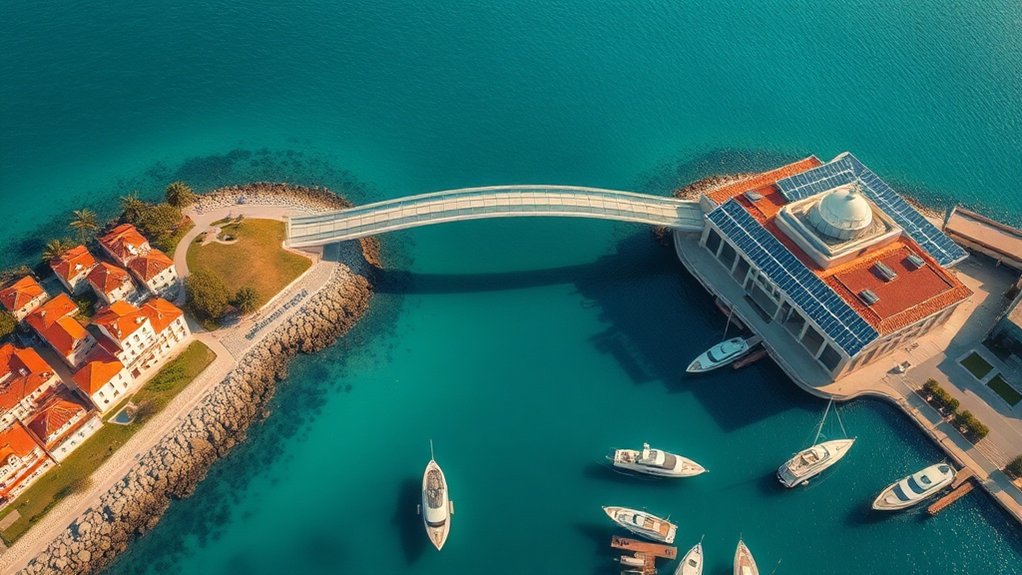
Once you’ve secured your D7 visa and established Portuguese residency, you’ll want to explore Portugal’s Non-Habitual Resident (NHR) tax regime to maximize your financial benefits. This program offers significant tax exemptions for qualifying foreign-sourced income, potentially reducing your tax burden for up to ten years. Understanding which income types qualify for exemptions and how different income classifications work under NHR can substantially impact your overall tax strategy as a digital nomad. Given the complexity of tax regulations and frequent policy changes, seeking specialized assistance ensures you properly navigate the NHR application process and avoid costly mistakes that could jeopardize your tax benefits.
Tax Exemption Eligibility
How can you maximize your tax savings while establishing Portuguese residency? The Non-Habitual Resident (NHR) tax regime offers substantial benefits for qualifying individuals. You’ll enjoy a flat 20% tax rate on eligible Portuguese-sourced income and potential exemptions on foreign income for ten years.
To qualify for NHR status, you must meet specific criteria:
- Residency Requirement: You haven’t been a Portuguese tax resident in the five years preceding your application
- Registration Timeline: You must apply for NHR status by March 31st of the year following your first year of Portuguese tax residency
- Income Classification: Your professional activities must fall under Portugal’s list of “high value-added” professions or scientific activities
Strategic timing of your residency establishment ensures you don’t miss this valuable opportunity. Similar to Brazil’s complex immigration framework, Portugal’s tax residency requirements involve specialized legal guidance to navigate the regulatory landscape and ensure compliance with current legislation.
Income Classification Benefits
Understanding which income types receive preferential treatment under the NHR regime can significantly impact your tax savings strategy. Foreign-sourced professional income from high-value activities listed in Portugal’s official classification enjoys complete tax exemption for ten years. This includes consulting, engineering, architecture, scientific research, and artistic activities.
Investment income like dividends, interest, and capital gains from foreign sources also receives favorable treatment, often taxed at reduced rates or exempted entirely. Pension income from foreign countries typically qualifies for the flat 10% tax rate, substantially lower than Portugal’s progressive rates.
You’ll maximize benefits by structuring your income streams strategically. Ensure your professional activities align with qualifying categories and maintain proper documentation of foreign-source income to substantiate exemption claims during tax assessments. For substantial investors seeking U.S. residency, the EB-5 visa provides an alternative pathway requiring significant capital commitment and job creation for American workers.
Legal Requirements and Documentation Process
While most countries allow tourists to enter with minimal documentation, transitioning to digital nomad status requires you to navigate a more complex web of legal requirements. You’ll need to gather substantial paperwork that proves your eligibility for extended residence.
The documentation process typically demands comprehensive financial records, employment verification, and background checks. You can’t simply extend your tourist visa indefinitely – immigration authorities require concrete evidence of your digital nomad credentials and financial stability.
Here’s what you’ll typically need to prepare:
- Financial Documentation: Bank statements showing consistent income streams, tax returns from previous years, and proof of remote employment or freelance contracts
- Legal Compliance Records: Criminal background checks from your home country, health insurance coverage meeting local requirements, and valid passport with sufficient validity
- Professional Verification: Employment letters confirming remote work arrangements, client testimonials for freelancers, and business registration documents if self-employed
Proper preparation streamlines your transition significantly. The risks of incorrect form filling and incomplete documentation can lead to potential delays, rejections, or sanctions that could derail your digital nomad plans entirely.
Timeline and Practical Implementation Steps
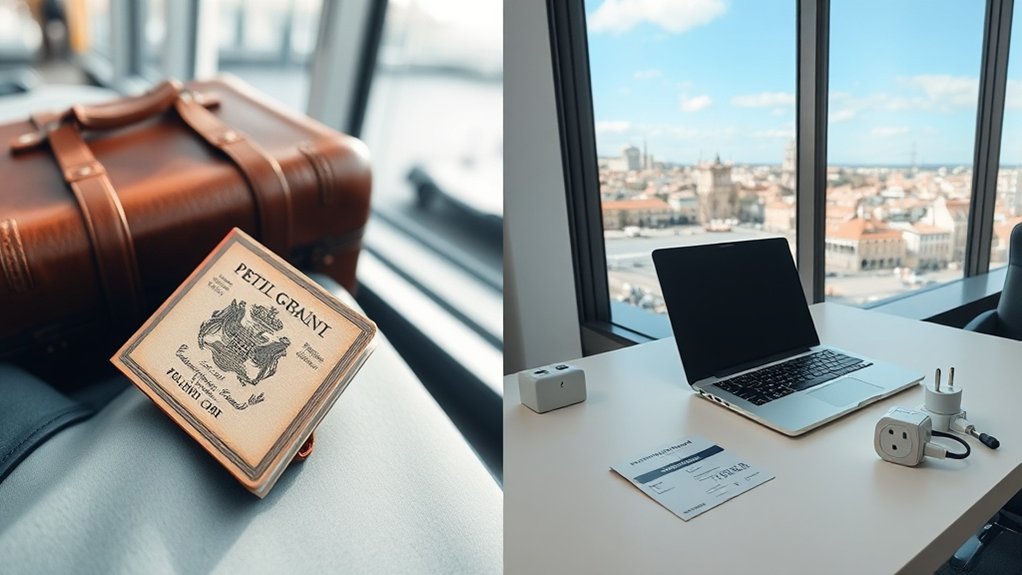
Once you’ve assembled your documentation, timing becomes your most critical factor in executing a smooth transition from tourist to digital nomad status. You’ll need to initiate your application while still holding valid tourist status, typically within 60-90 days of your initial entry. Don’t wait until your tourist visa expires.
Start by scheduling your appointment at the immigration office immediately after gathering all required documents. Processing times vary between 30-45 days, so you’ll want buffer time before your tourist status lapses.
During the waiting period, you can’t legally work for Brazilian companies, but you can continue your remote work for foreign employers. Keep detailed records of all interactions with immigration authorities and maintain copies of submitted documents.
Once approved, you’ll receive your temporary residence card within 10-15 business days. This allows you to establish a Brazilian bank account, obtain a CPF number, and begin your official digital nomad journey in Brazil.
Financial Planning and Tax Optimization Strategies
Beyond securing your legal status, you’ll need to structure your finances strategically to maximize your earning potential while minimizing your tax burden as a Brazilian digital nomad.
Brazil’s tax system can work in your favor when properly navigated. You’ll want to establish the most advantageous business structure for your remote work income while ensuring compliance with both Brazilian and international tax obligations.
Key financial optimization strategies include:
- Choose the right business entity – Evaluate MEI (Individual Microentrepreneur), Simples Nacional, or other corporate structures based on your income projections and business activities
- Leverage tax treaties – Understand bilateral agreements between Brazil and your client countries to avoid double taxation and reduce withholding rates
- Optimize currency management – Implement strategies for foreign exchange conversions, international banking, and maintaining multi-currency accounts to minimize conversion costs
Proper financial planning ensures you’re not just legally compliant but financially optimized for long-term success in Brazil.
Long-Term Residency Maintenance and Compliance
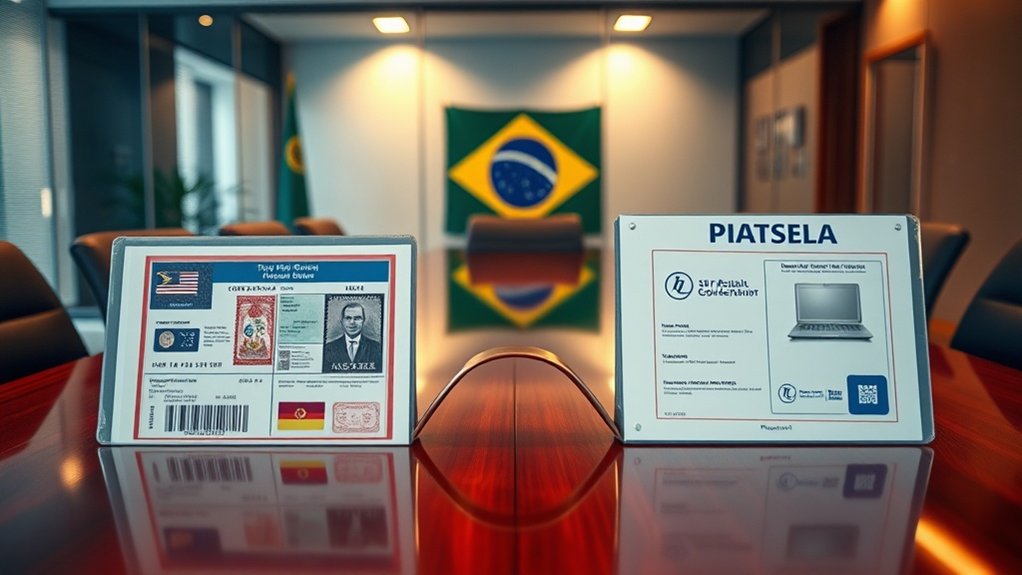
After establishing your financial foundation, maintaining your Brazilian residency requires consistent attention to legal obligations and renewal procedures. You’ll need to renew your visa annually, demonstrating continued compliance with income requirements and tax obligations. Keep meticulous records of your Brazilian tax filings, proof of income, and any changes to your business structure.
You must maintain your primary residence address registration and update authorities about any relocations within Brazil. Don’t neglect your CPF obligations – file annual tax returns even if you owe nothing. Monitor changes in immigration laws that could affect your status.
Track your physical presence in Brazil carefully. Extended absences might jeopardize your residency. Maintain active bank accounts and document your ongoing ties to Brazil through lease agreements, utility bills, and local business activities.
Consider applying for permanent residency after meeting eligibility requirements. This provides greater stability and eliminates annual renewal stress while maintaining your path toward eventual citizenship.
Frequently Asked Questions
Can I apply for a Brazil digital nomad visa while in Brazil?
No, applicants must usually apply from outside Brazil at a Brazilian consulate or embassy.
Does a digital nomad visa count towards residency?
Yes, it can contribute to temporary residency, which may later lead to permanent residence under Brazilian immigration rules.
How long is the digital nomad visa in Brazil?
The visa is typically valid for 1 year and can often be renewed for up to 2 additional years.
What is the benefit of digital nomad visa in Brazil?
It allows remote workers to live legally in Brazil, work for foreign companies, and access banking, healthcare, and legal protections.
Can Family Members Accompany Me During the Tourist Entry Phase?
Yes, your family members can accompany you during the tourist entry phase. You’ll need to ensure they have valid passports and meet Portugal’s tourist entry requirements. They can stay with you for up to 90 days within a 180-day period under the Schengen tourist visa waiver. However, they’ll need separate applications when you transition to the digital nomad residence permit later.
What Happens if My D7 Visa Application Gets Rejected?
If your D7 visa application gets rejected, you’ll receive a written decision explaining the reasons for denial. You can appeal the decision within 30 days or reapply after addressing the issues that caused rejection. During this time, you’ll need to maintain legal status in Portugal, which might mean leaving and re-entering as a tourist or applying for a different visa type.
Are There Specific Health Insurance Requirements for Digital Nomads?
Yes, you’ll need comprehensive health insurance covering medical expenses, hospitalization, and repatriation with minimum coverage of €30,000. Your insurance must be valid throughout Portugal and the Schengen area for your entire stay duration. You can use private international health insurance, travel insurance, or European Health Insurance Card if you’re an EU citizen. The insurance must be active before your application submission.
Can I Purchase Property in Portugal Before Obtaining Residency?
Yes, you can purchase property in Portugal before obtaining residency. There’s no legal requirement to be a resident first. You’ll need a Portuguese tax number (NIF) and can buy as a non-resident. However, you’ll face higher tax rates on rental income and capital gains compared to residents. The property purchase doesn’t automatically grant residency rights, but it can support certain visa applications later.
What Are the Renewal Costs for Maintaining Long-Term Residence Status?
You’ll face renewal costs every two years for your temporary residence permit, typically ranging from €83-€272 in government fees plus legal assistance costs of €500-€1,500. After five years, you can apply for permanent residence with fees around €272-€544. If you’re pursuing citizenship after five years, expect costs of €200-€500 in government fees plus additional legal support expenses.
Conclusion
You’ve now got a clear roadmap for transitioning from tourist to digital nomad resident in Portugal. By following Vieira Braga Advogados’ two-step approach, you’ll maximize your chances of success while minimizing legal complications. Don’t underestimate the importance of proper documentation and financial planning throughout this process. With careful execution of the tourist entry phase followed by strategic D7 visa application, you’ll secure your Portuguese residency and unlock long-term remote work opportunities.


